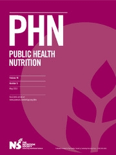
PUBLIC HEALTH NUTRITION
Scope & Guideline
Catalyzing Change in Public Health Nutrition
Introduction
Aims and Scopes
- Public Health Nutrition Research:
The journal covers a broad range of studies exploring the relationship between nutrition and public health outcomes, including obesity, malnutrition, and chronic diseases. This includes epidemiological studies, clinical trials, and community-based research. - Food Security and Insecurity:
Research focusing on food security issues, including access to nutritious foods, the impact of economic factors on food availability, and the role of food assistance programs. - Nutritional Interventions and Policies:
The journal emphasizes studies assessing the effectiveness of nutrition policies and interventions aimed at improving public health, such as food labeling regulations, dietary guidelines, and community nutrition programs. - Dietary Patterns and Health Outcomes:
Investigations into dietary patterns, including the consumption of ultra-processed foods, and their associations with health outcomes such as obesity, diabetes, and cardiovascular diseases. - Cultural and Socioeconomic Influences on Nutrition:
Research examining how cultural, social, and economic factors influence dietary habits and nutrition-related behaviors across different populations. - Nutrition Education and Behavior Change:
Studies focused on nutrition education strategies and their effectiveness in promoting healthy eating behaviors among diverse populations, particularly in schools and community settings.
Trending and Emerging
- Impact of COVID-19 on Nutrition:
A significant number of studies are emerging that analyze the effects of the COVID-19 pandemic on dietary behaviors, food security, and health outcomes, reflecting the urgent need to understand how global crises affect public health nutrition. - Ultra-Processed Foods and Health:
Research focusing on the impact of ultra-processed food consumption on health outcomes is gaining momentum, as there is increasing concern over the role of these foods in the rising rates of obesity and chronic diseases. - Nutrition and Mental Health:
There is a growing interest in the links between nutrition and mental health, with studies exploring how dietary patterns influence mental health outcomes, particularly in vulnerable populations. - Sustainable Diets and Environmental Impact:
Emerging research is addressing the intersection of nutrition and sustainability, with a focus on how dietary patterns can be optimized for both health and environmental sustainability. - Food Justice and Equity:
There is an increasing emphasis on food justice, equity, and the social determinants of health, highlighting the need for nutrition research to address disparities in access to healthy foods. - Digital and Online Nutrition Interventions:
The rise of digital health tools and online platforms for nutrition education and behavior change is a trending focus, especially in response to the growth of telehealth and online interventions during the pandemic.
Declining or Waning
- Traditional Nutritional Guidelines:
There seems to be a waning focus on traditional dietary guidelines, as researchers increasingly explore more personalized and context-specific dietary recommendations that consider individual and community needs. - Generalized Nutrition Education Programs:
While nutrition education remains important, the emphasis on generic programs has decreased as more targeted, culturally relevant, and behaviorally focused approaches gain traction. - Single Nutrient Studies:
Research concentrating solely on individual nutrients without considering the broader dietary context is less frequently published, as there is a growing recognition of the importance of overall dietary patterns. - Food Industry Partnerships:
There is a noticeable decline in studies examining partnerships between public health organizations and the food industry, likely due to increasing scrutiny over conflicts of interest and the push for more independent research. - Food Marketing Regulations:
The focus on food marketing regulations, especially in relation to children, appears to be less prominent, possibly overshadowed by broader discussions on food systems and health equity.
Similar Journals

Jurnal Gizi dan Pangan
Transforming Research into Dietary SolutionsJurnal Gizi dan Pangan, published by the esteemed Bogor Agricultural University under the Department of Community Nutrition, is a pivotal platform for advancing knowledge in the realms of nutrition and food science. Since its inception in 2006, this Open Access journal (ISSN: 1978-1059; E-ISSN: 2407-0920) has been committed to disseminating high-quality research that addresses critical issues related to community nutrition and public health. Located in Bogor, Indonesia, it serves as a regional beacon for researchers, professionals, and students seeking to improve dietary practices and food security outcomes. As it aims to foster interdisciplinary collaboration and innovation, Jurnal Gizi dan Pangan is essential for those dedicated to the enhancement of nutritional science and its application in diverse populations.

Nutrition Journal
Shaping Public Health through Evidence-Based Nutrition Research.Nutrition Journal is a prestigious open-access publication from BMC, dedicated to advancing the field of nutrition and dietetics since its inception in 2002. With an impressive impact factor and a notable Scopus ranking, it ranks in the top quartile (Q1) in both Medicine (miscellaneous) and Nutrition and Dietetics, highlighting its significant contribution to health sciences. Based in the United Kingdom, the journal covers a broad spectrum of topics, making it an essential resource for researchers, healthcare professionals, and students interested in nutrition's role in health and disease prevention. The journal not only facilitates the dissemination of groundbreaking research but also prioritizes accessibility, allowing global audiences to engage with vital findings that shape dietary practices and public health policies. With a commitment to interdisciplinary collaboration, Nutrition Journal fosters an environment where innovative ideas and evidence-based solutions can flourish, making it a cornerstone reference in the field.

ERNAHRUNGS UMSCHAU
Transforming Public Health Through Nutritional ResearchERNAHRUNGS UMSCHAU is a vital publication in the fields of nutrition and dietetics, established in Germany and published by UMSCHAU VERLAG. Since its inception in 1973, this journal has served as a platform for disseminating research and insights on dietary practices, nutritional science, and public health approaches related to nutrition. Although it currently holds a Q4 ranking in both Medicine (miscellaneous) and Nutrition and Dietetics, signaling its emerging status within these categories, it remains an essential resource for professionals, researchers, and students seeking to enhance their understanding of dietary impacts on health. With a broad scope covering various aspects of nutritional science, ERNAHRUNGS UMSCHAU contributes to the ongoing dialogue in public health and nutrition, offering valuable perspectives that inform practice and policy. The journal is published in both print and digital formats, ensuring accessibility to its diverse readership.
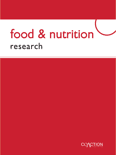
Food & Nutrition Research
Elevating Dietary Knowledge for Public Health ProgressFood & Nutrition Research is a distinguished open-access journal published by the Swedish Nutrition Foundation, dedicated to advancing the field of food science and nutrition. With its ISSN 1654-6628 and E-ISSN 1654-661X, the journal has established itself as a leading platform for disseminating high-quality research since its transition to open access in 2008. Based in Lund, Sweden, this journal covers a broad spectrum of topics related to nutrition and dietetics, public health, and environmental health, achieving impressive rankings across several categories, including Q1 in Food Science and Q2 in Nutrition and Dietetics for 2023. Researchers and practitioners benefit from its accessibility and the opportunity to stay updated with significant developments in the field, given its notable Scopus rankings, which place it within the top percentiles of related disciplines. With converged years spanning from 2008 to 2024, Food & Nutrition Research serves as an essential resource for those committed to improving health outcomes through informed dietary practices.

Nutrition & Metabolism
Pioneering Research in Nutrition and Metabolic HealthNutrition & Metabolism, published by BMC, is a leading open-access journal that has been pivotal in advancing research within the domains of nutrition, metabolic science, and endocrinology since its inception in 2004. With an impressive impact in its field, this journal boasts classification in the Q1 category in both Nutrition and Dietetics and Medicine (miscellaneous), as well as Q2 in Endocrinology, Diabetes and Metabolism for 2023. It ranks in the top percentiles of its Scopus categories, highlighting its significance to the scholarly community, with notable placements such as rank 22 out of 140 in Nutrition and Dietetics. The journal's commitment to open access ensures that groundbreaking research is readily available to researchers, practitioners, and students alike, fostering collaboration and innovation across disciplines. Based in the United Kingdom, Nutrition & Metabolism continues to shape the future of nutritional science and metabolic studies, inviting submissions that address pivotal questions and drive the field forward.
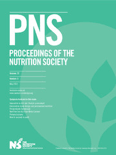
PROCEEDINGS OF THE NUTRITION SOCIETY
Transforming Dietary Insights into Health SolutionsPROCEEDINGS OF THE NUTRITION SOCIETY, published by Cambridge University Press, stands as a leading forum for the dissemination of cutting-edge research in the fields of Nutrition and Dietetics as well as broader medical sciences. With an impressive impact factor and ranked Q1 in both its categories, the journal has established itself at the forefront of nutritional research since its inception in 1944. The journal aims to foster scientific discourse and innovation, presenting a variety of original research articles, reviews, and clinical guidelines that are invaluable to researchers, practitioners, and students alike. Although it is not an open-access publication, access options are available for institutions and individuals, ensuring a wide reach for groundbreaking studies. As a vital resource, PROCEEDINGS OF THE NUTRITION SOCIETY invites submissions that advance understanding of nutritional science, contribute to public health advancements, and promote evidence-based dietary practices.
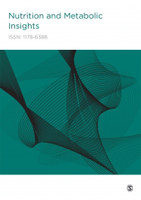
Nutrition and Metabolic Insights
Unlocking the secrets of nutrition for better health outcomes.Nutrition and Metabolic Insights is a distinguished open-access journal published by SAGE Publications Ltd, dedicated to advancing the fields of nutrition, metabolic processes, and dietary sciences. Since its inception in 2008, this journal has carved a niche for itself within the academic community, offering a platform for rigorous research and innovative findings. With a focus on multidisciplinary approaches, it publishes articles that explore vital aspects of Endocrinology, Diabetes and Metabolism, Food Science, and Nutrition and Dietetics, earning recognition with a 2023 Q2 ranking in Food Science and Q3 rankings in other critical categories. Researchers and professionals can access cutting-edge research that not only contributes to academic discourse but also informs clinical practice and public health discussions. By facilitating the dissemination of knowledge, Nutrition and Metabolic Insights plays a crucial role in improving health outcomes worldwide, making it an essential resource for students, researchers, and health professionals alike.
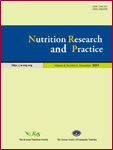
Nutrition Research and Practice
Pioneering discoveries in nutrition and public health.Nutrition Research and Practice is a prominent journal dedicated to advancing the field of nutrition and dietetics, published by the esteemed Korean Nutrition Society. With a focus on high-quality research and practical applications, this journal serves as a vital platform for scholars and professionals to disseminate new findings in the interdisciplinary realms of food science and nutrition. The journal boasts an impressive 2023 impact factor, categorizing it in the Q2 quartile in Food Science and Q3 in Nutrition and Dietetics, illustrating its significant reach and impact among peers. Despite being a non-open access publication, it continues to draw attention with its rigorous peer-review process, ensuring that only the most relevant and innovative contributions are shared. With coverage from 2010 to 2024, the journal not only supports a wealth of research but also aims to influence dietary practices and policies in South Korea and globally. Located in the heart of Seoul, Nutrition Research and Practice is an essential resource for researchers, practitioners, and students seeking to deepen their understanding of nutrition and improve public health outcomes.
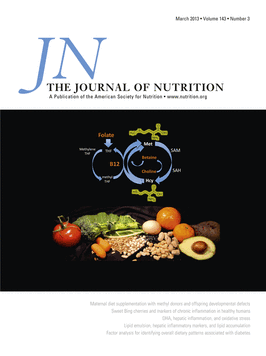
JOURNAL OF NUTRITION
Elevating the standards of nutritional research since 1945.JOURNAL OF NUTRITION is a premier academic journal published by Elsevier Science Inc, dedicated to advancing the understanding of nutritional science and its impact on health. With a long-standing tradition since its inception in 1945, the journal provides a vital platform for high-quality research, featuring articles that cover a wide range of topics within the fields of Medicine and Nutrition and Dietetics. Recognized for its significant contributions, the journal holds an impressive impact factor, with a Q1 rank in both Medicine (miscellaneous) and Nutrition and Dietetics as of 2023, positioning it among the top tier of scholarly publications in these disciplines. The Scopus Rankings further validate its status, boasting a rank of #57/398 in Medicine and #30/140 in Nutrition, indicating its influential presence in the research community. Although it operates under a traditional access model, the journal actively engages with a global audience of researchers, professionals, and students by disseminating cutting-edge insights designed to inform nutrition policy and practice. By focusing on current trends, innovative methodologies, and evidence-based nutrition strategies, the JOURNAL OF NUTRITION continues to be an essential resource for those committed to enhancing health through nutrition.

Revista Chilena de Nutricion
Empowering the Future of Nutrition Through ResearchRevista Chilena de Nutrición is a pivotal academic journal dedicated to the fields of nutrition and dietetics, published by the SOC CHILENA NUTRICION, BROMATOLOGIA & TOXICOLOGIA. With its long-standing history, from its inception in 1981 to its contemporary contributions, the journal serves as a crucial platform for the dissemination of research, insights, and advancements within the nutritional sciences. Although currently not listed as Open Access, its articles are accessible to a diverse audience, including researchers, healthcare professionals, and students, all keen on enhancing their understanding of nutrition science. The journal is ranked in the Q3 category in Food Science and Q4 in Nutrition and Dietetics for 2023, indicating its growing reputation and respectable position in the scholarly community. With Scopus rankings of #281 in Food Science and #106 in Nutrition and Dietetics, the Revista Chilena de Nutrición remains essential for those wishing to remain at the forefront of evidence-based nutritional research and practice.